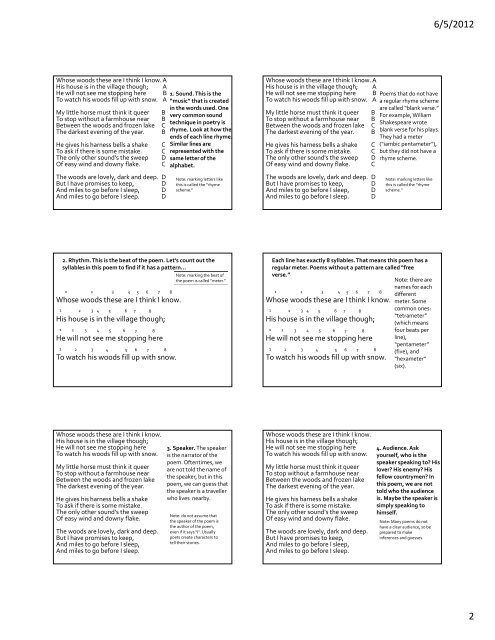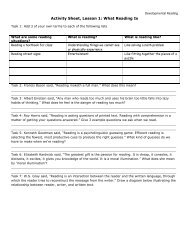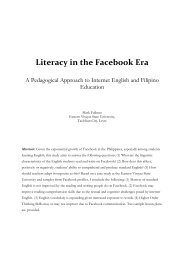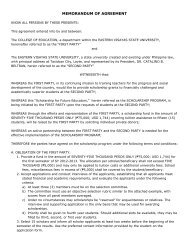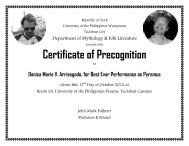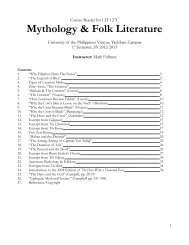PDF handout of the 32 Powerpoints - Mark Fullmer
PDF handout of the 32 Powerpoints - Mark Fullmer
PDF handout of the 32 Powerpoints - Mark Fullmer
You also want an ePaper? Increase the reach of your titles
YUMPU automatically turns print PDFs into web optimized ePapers that Google loves.
6/5/2012Whose woods <strong>the</strong>se are I think I know. AHis house is in <strong>the</strong> village though; AHe will not see me stopping here BTo watch his woods fill up with snow. AMy little horse must think it queerTo stop without a farmhouse nearBetween <strong>the</strong> woods and frozen lakeThe darkest evening <strong>of</strong> <strong>the</strong> year.He gives his harness bells a shakeTo ask if <strong>the</strong>re is some mistake.The only o<strong>the</strong>r sound's <strong>the</strong> sweepOf easy wind and downy flake.BBCBCCDCThe woods are lovely, dark and deep. DBut I have promises to keep,And miles to go before I sleep,DDAnd miles to go before I sleep. D1. Sound. This is <strong>the</strong>“music” that is createdin <strong>the</strong> words used. Onevery common soundtechnique in poetry isrhyme. Look at how <strong>the</strong>ends <strong>of</strong> each line rhyme.Similar lines arerepresented with <strong>the</strong>same letter <strong>of</strong> <strong>the</strong>alphabet.Note: marking letters likethis is called <strong>the</strong> “rhymescheme.”Whose woods <strong>the</strong>se are I think I know. AHis house is in <strong>the</strong> village though; AHe will not see me stopping here BTo watch his woods fill up with snow. AMy little horse must think it queerTo stop without a farmhouse nearBetween <strong>the</strong> woods and frozen lakeThe darkest evening <strong>of</strong> <strong>the</strong> year.He gives his harness bells a shakeTo ask if <strong>the</strong>re is some mistake.The only o<strong>the</strong>r sound's <strong>the</strong> sweepOf easy wind and downy flake.BBCBCCDCThe woods are lovely, dark and deep. DBut I have promises to keep,And miles to go before I sleep,DDAnd miles to go before I sleep. DPoems that do not havea regular rhyme schemeare called “blank verse.”For example, WilliamShakespeare wroteblank verse for his plays.They had a meter(“iambic pentameter”),but <strong>the</strong>y did not have arhyme scheme.Note: marking letters likethis is called <strong>the</strong> “rhymescheme.”2. Rhythm. This is <strong>the</strong> beat <strong>of</strong> <strong>the</strong> poem. Let’s count out <strong>the</strong>syllables in this poem to find if it has a pattern…1 2 3 4 5 6 7 8Whose woods <strong>the</strong>se are I think I know.1 2 3 4 5 6 7 8His house is in <strong>the</strong> village though;1 2 3 4 5 6 7 8He will not see me stopping here1 2 3 4 5 6 7 8To watch his woods fill up with snow.Note: marking <strong>the</strong> beat <strong>of</strong><strong>the</strong> poem is called “meter.”Each line has exactly 8 syllables. That means this poem has aregular meter. Poems without a pattern are called “freeverse.”Note: <strong>the</strong>re arenames for each1 2 3 4 5 6 7 8differentmeter. Some1 2 3 4 5 6 7 8common ones:“tetrameter”(which means1 2 3 4 5 6 7 8four beats perline),“pentameter”1 2 3 4 5 6 7 8 (five), and“hexameter”(six).Whose woods <strong>the</strong>se are I think I know.His house is in <strong>the</strong> village though;He will not see me stopping hereTo watch his woods fill up with snow.Whose woods <strong>the</strong>se are I think I know.His house is in <strong>the</strong> village though;He will not see me stopping hereTo watch his woods fill up with snow.My little horse must think it queerTo stop without a farmhouse nearBetween <strong>the</strong> woods and frozen lakeThe darkest evening <strong>of</strong> <strong>the</strong> year.He gives his harness bells a shakeTo ask if <strong>the</strong>re is some mistake.The only o<strong>the</strong>r sound's <strong>the</strong> sweepOf easy wind and downy flake.The woods are lovely, dark and deep.But I have promises to keep,And miles to go before I sleep,And miles to go before I sleep.3. Speaker. The speakeris <strong>the</strong> narrator <strong>of</strong> <strong>the</strong>poem. Oftentimes, weare not told <strong>the</strong> name <strong>of</strong><strong>the</strong> speaker, but in thispoem, we can guess that<strong>the</strong> speaker is a travellerwho lives nearby.Note: do not assume that<strong>the</strong> speaker <strong>of</strong> <strong>the</strong> poem is<strong>the</strong> author <strong>of</strong> <strong>the</strong> poem,even if it says “I”. Usuallypoets create characters totell <strong>the</strong>ir stories.Whose woods <strong>the</strong>se are I think I know.His house is in <strong>the</strong> village though;He will not see me stopping hereTo watch his woods fill up with snow.My little horse must think it queerTo stop without a farmhouse nearBetween <strong>the</strong> woods and frozen lakeThe darkest evening <strong>of</strong> <strong>the</strong> year.He gives his harness bells a shakeTo ask if <strong>the</strong>re is some mistake.The only o<strong>the</strong>r sound's <strong>the</strong> sweepOf easy wind and downy flake.The woods are lovely, dark and deep.But I have promises to keep,And miles to go before I sleep,And miles to go before I sleep.4. Audience. Askyourself, who is <strong>the</strong>speaker speaking to? Hislover? His enemy? Hisfellow countrymen? Inthis poem, we are nottold who <strong>the</strong> audienceis. Maybe <strong>the</strong> speaker issimply speaking tohimself.Note: Many poems do nothave a clear audience, so beprepared to makeinferences and guesses.2


